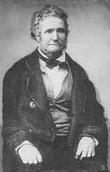Martin Cash was born to a wealthy family in Enniscorthy, County Wexford, Ireland in 1808. He worked as a farm labourer throughout his childhood. In March 1827, he was convicted of housebreaking involving an incident with a woman he was smitten with. Cash was sentenced to several years of penal transportation to Tasmania.
The ship arrived in Sydney on February 10, 1828, and Cash subsequently carried out his seven year sentence as a stockrider. He even stayed on for an additional two years after obtaining his ticket of leave. During this period he began a relationship with Bessie Clifford. After becoming involved in cattle duffing, Cash and Bessie fled to Tasmania, arriving in February 10, 1837.
After a few months of working odd jobs in Tasmania, Cash was arrested again for stealing from his employer. He was convicted of larceny and sentenced to seven years imprisonment at Hobart Gaol. Cash soon escaped but was promptly recaptured and faced an additional eighteen months imprisonment. This attempt was followed by a second that also failed. Now facing over ten years of jail time, Cash was sent to the notorious "escape-proof" Port Arthur Gaol.
On December 26 1842, Cash, George Jones and Lawrence Kavenagh escaped from a work party and made their way through dense bushland to Eaglehawk Neck and then across the waters to the other side.The trio then turned to bushranging and soon became infamous throughout Tasmania. They soon became known as "Cash and Co." and gained a reputation as ‘gentlemen bushrangers’.
In August 1843, Cash discovered that Bessie was involved with another man in Hobart. Cash and Kavenagh quickly traveled to Hobart but were promptly identified and became involved in a shootout where Kavenagh and a police constable was injured. Cash was apprehended and. Kevenagh soon gave himself up as he was facing potentially life-threatening injuries. Two days later the police constable died of his wounds and Cash was now facing murder charges. Both Cash and Kevenagh were sentenced to death but a last minute reprieve gave the men an extra fourteen months for a final decision. The death sentences of the two men were reduced to life imprisonment on Norfolk Island.
After arriving in Norfolk in December 1844, Cash settled down and eventually became a prison trustee in 1852. Cash later met Mary Bennett and was given permission to marry her in 1854. That same year he was given a ticket of leave and he and Mary moved to Tasmania where Cash was appointed as a constable for the Cascades Female Factory. He later worked as an overseer at the Royal Hobart Botanical Gardens.
In June 24, 1856, Cash received a conditional pardon. By this time Bennett had given birth to a son, Martin, and a second child was on the way, Monique. Cash would leave his family and move to New Zealand for four years, becoming a police constable and later finding success as a brothel owner. On July 11, 1863, Cash was granted a full pardon and subsequently purchased a farm at Glenorchy where he remained for the rest of his life. In this last period of his life, Cash dictated his memoirs to the writer James Lester Burke who published them as an autobiography in 1870 under the title of “The Adventures of Martin Cash” which continues to be reprinted in the present. Martin Cash died on August 27 1877, due to health complications associated with old age.
See full Austlit entry.


